

English For Kids - Lingokids - The Playlearning™ App in English. Lingokids is the playlearning™ app for kids ages 2 to 8.
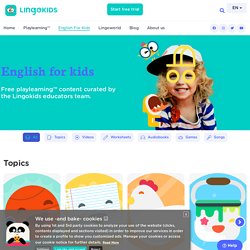
The best way for kids to learn a new language at this age is through fun games and exercises that not only keep their attention but also allow them to learn more effectively. Start your free 7 days! The Lingokids curriculum has been designed by experts who specialize in early language learning. Furthermore, it features teaching materials from the esteemed Oxford University Press to provide a quality education experience. Lingokids is specially designed for kids and offers a safe environment that is free from distractions and ads.Watch your child become bilingual as they have fun and enjoy engaging lessons! Index. Months and dates.
Free classroom food games and activities for children. Materials: small bag, toy foodClass Size: AllGet the students sitting down in a circle.
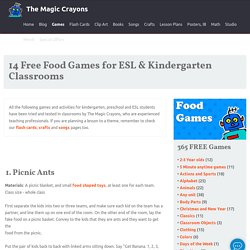
Place one of the plastic food items in the bag without the class seeing which one it is. Have the students pass the bag around the room, guessing what is inside. Ask the students what they think it is, and have one of the students (otoubansan?) Open it to see if they are correct. Towards the end, place non-food items in the bag for maximum deception and hilarity.Set the Table Race- Dave SBest suited level: Cho. Divide the class into two teams (or more if a large class) Have them sit down in lines. Model the game by joining one of the teams and stand at the front of the line. ESL Miming Games. Family Members Fun Games. Give students more practice on family members vocabulary and related sentences using these fun games.
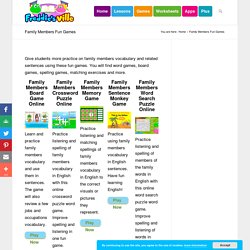
Games for Learning English, Vocabulary, Grammar Games, Activities, ESL. Interactive Fun Vocabulary Games for Young Learners. ESL vocabulary games are a fun way to teach children in the classroom.
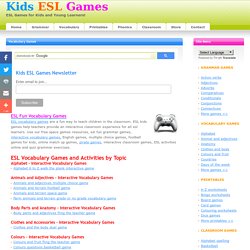
ESL kids games help teachers provide an interactive classroom experience for all esl learners. Use our free space games resources, esl fun grammar games, interactive vocabulary games, English games, multiple choice games, football games for kids, online match up games, pirate games, interactive classroom games, ESL activities online and quiz grammar exercises. ESL Vocabulary Games and Activities by Topic Alphabet - Interactive Vocabulary Games Alphabet A to Z walk the plank interactive game Animals and Adjectives - Interactive Vocabulary Games. Free classroom family members games and activities for children.
Materials: Family / Feelings Flash Cards (Daddy, Mummy, Brother, Sister, Baby, Grandpa, Grandma, Family - Happy, Sad, Angry, Hot, Cold, Sleepy, Thirsty, Hungry, Tired)To play:Review the FCs (Family and Feelings) Divide the class into two lines with some space in between them.
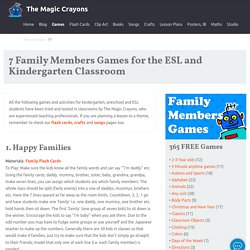
Place all the FC's on the floor between the 2 teams. Team 1 is the "Inquisitor team" and asks all the questions. The first student in team 1 must ask the first student in Team 2 to identify a card using the formula: "[Name], what's this? " and pointing to the card If the student answers correctly, their team scores a point.
If not, the "Inquisitor team" scores a point. ESL Fun Grammar Games,Prepositions of Place - in, on, under, above, next to - Memory Audio Game. ESL Interactive Fun Games Here we have the games carefully laid out for you.
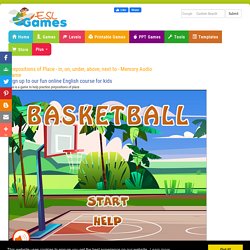
Follow the links to browse the variety of games offered. Start Learning English with 21 Popular Songs! Did you know that Beyoncé and Adele are excellent English teachers?

Can you believe that famous old songs by Michael Jackson, The Beatles and Elvis Presley are perfect for learning English grammar? Well, it’s not just about making learning fun—it’s about philosophy. The ancient philosopher Plato said that “Musical training is a more potent instrument than any other, because rhythm and harmony find their way into the inward places of the soul.”
Of course, Plato lived thousands of years ago, so that quote may seem a bit complicated to us today. I think if he had to say the same thing on Twitter, he might say something like “Music is excellent because it has the power to move us.” As an English teacher, I try to use that idea by including songs in as many classes as I can. I enjoy using music in my classes and, more importantly, my students enjoy it too. Place Prepositions ESL Activities Games Worksheets. 6 Brilliant Hands-on Exercises That Teach English Prepositions. Is a bird in the hand really worth two in the bush?

The answer is yes, when you’re talking about teaching. Making teaching sensory—that is, getting students’ senses involved while learning—is the ultimate way to teach. And while most lessons include a visual and aural aspect, including the sense of touch is often the difficult part. It’s especially challenging when teaching something as intangible as the English language. But fear not! Five fun activities to teach prepositions. How do you make learning prepositions easier for your students?

TeachingEnglish blog award winner Aoife McLoughlin of ELT-Connect has some tips. ESL Kids Classroom Games & Activities. Airplane competition: First, have your students make some paper airplanes.
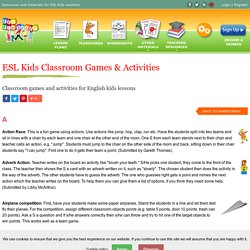
Stand the students in a line and let them test fly their planes. For the competition, assign different classroom objects points (e.g. table 5 points, door 10 points, trash can 20 points). Ask a S a question and if s/he answers correctly then s/he can throw and try to hit one of the target objects to win points. This works well as a team game. Apple Pass: Have all students sit in a circle. Art Gallery: This is a great activity for reviewing vocab.
Colors - A Complete ESL Lesson Plan. Teaching colors to beginner language learners will enable them to begin to describe the things around them. With so many colors, however, learning colors vocabulary can be challenging. Warm up and wrap up lesson plan. Notes: The beginning of your lesson is extremely important: you set the tone of your lesson and get everyone in the right frame of mind for learning English. It is also an opportunity to check homework and review previous lessons. Warm up Procedure: Suggestions for the start of your lessons: These activities can be done in the following order at the start of your lesson: 1. 2. Colors Lesson Plan. Notes: This is a nice, easy fun lesson - parts of it can be reused in later lessons as your students continue to learn the color words. Lesson Procedure: Warm Up and Maintenance: See our "Warm Up & Wrap Up" page.
Idiom Activity for ESL Students. Eslspeaking. Teaching Colors in English: Games, Activities, Lesson Plans & More. Demonstration ‘Ideas for using flashcards’ for Macmillan ELT Spain – Carol Read. Kids and vocabulary. Recording vocabulary Do you encourage your learners to keep vocabulary records? Get them to write new words at the back of their notebooks during class. Check they know how to pronounce each word and have them underline the main stress. They could also write a translation, or draw a picture of the word. Higher levels can include an example of the word in a sentence to give it context. Introducing and practising vocabularyThere are over 100 word games on LearnEnglish Kids that help learners learn and practise new vocabulary through picture matching games.
Introduce each vocabulary item with the flashcards. Make dialogues using new vocabulary items. Recycling vocabularyHere are a variety of games your learners will enjoy playing whilst practising their language skills and recycling target vocabulary. Bingo. 6 Tips for Teaching English to Complete Beginners. Here’s how to teach English to beginners. Think back to your childhood. Do you remember when an adult asked you something and you just stared open-mouthed (not because you were trying to be rude or anything) because it was all gobbledygook to you? That’s exactly how ESL beginners feel in a language classroom. If the teacher starts rambling in a language they don’t understand, they’ll just get nervous and shut down.
Eslspeaking. Kids and vocabulary.